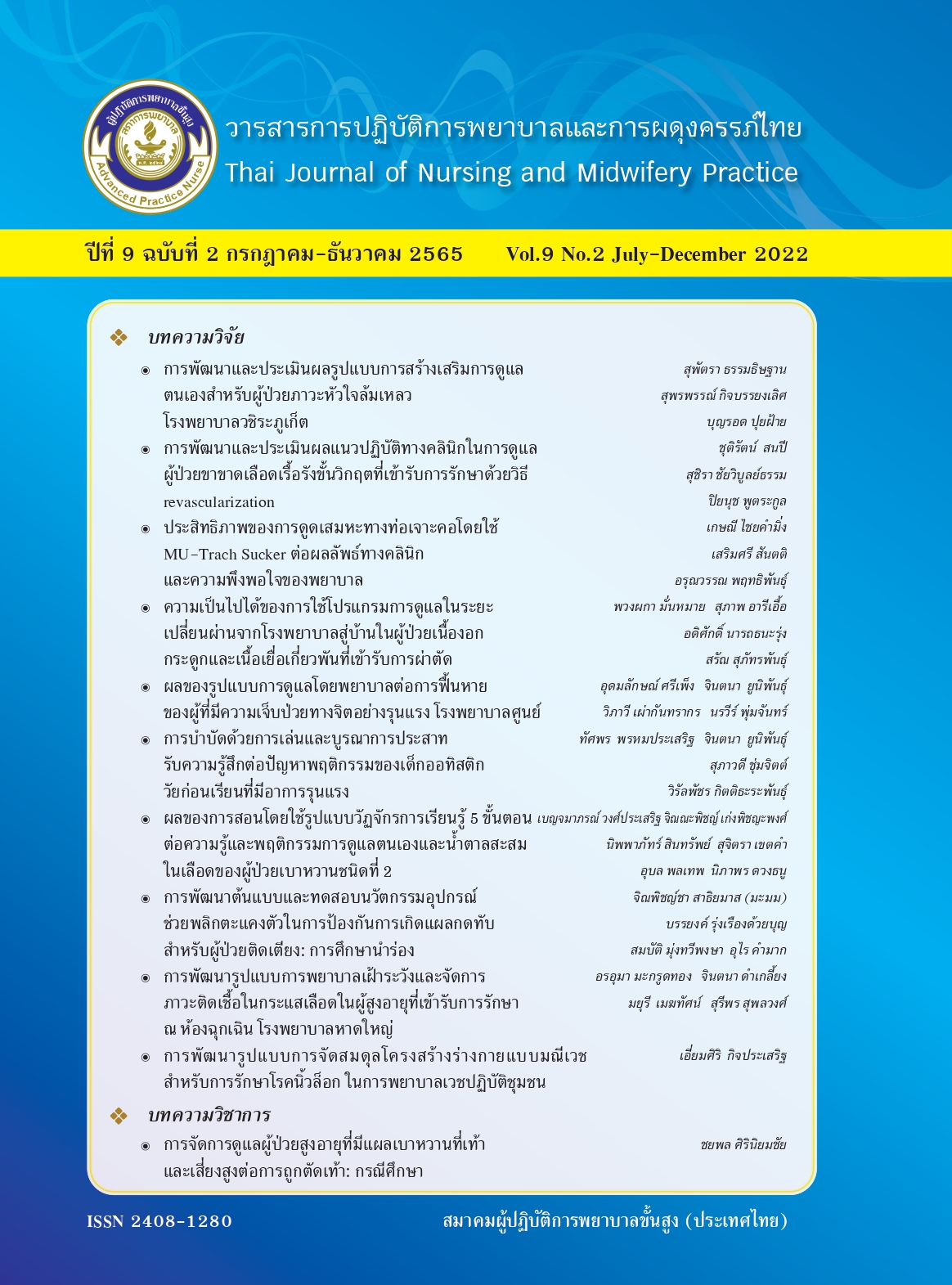The Development and Evaluation of the Self-care Enhancement Model for Patients with Heart Failure, Vachira Phuket Hospital
Main Article Content
Abstract
This research and development study aims to develop the Self-care Enhancement Model for Patients with Heart Failure (ScEM-HF) and evaluate after implementing the model at the Heart Failure (HF) Clinic, Vachira Phuket Hospital. The outcomes included (1) clinical outcomes (readmission, presence of volume overload, stress), (2) intermediate outcomes (HF self-care and HF self-care knowledge), and (3) satisfaction with the ScEM-HF. The study was conducted in 4 stages: Stage 1-situational analysis and examining information related to HF self-care, Stage 2-development of the ScEM-HF, Stage 3-implementing and evaluating the ScEM-HF, and Stage 4-modifying the ScEM-HF and recommendation.
The participants were 26 HF patients who attended the HF clinic, recruited according to the
inclusion criteria, 6 personnel in the multidisciplinary team, and 15 health volunteers. Of these respective participants, 13, 6, and 5 participated in the interview sessions during the
first stage. The study instruments were examined for validity and reliability. Qualitative data were analyzed using the content analysis technique. Pre-implementation quantitative data were compared with those of post-implementation using McNemar test and Wilcoxon Signed
Rank test. The results indicated that the clinical outcomes improved significantly. The heart
failure self-care subscale scores and the overall heart failure knowledge scores increased
significantly. The multidisciplinary team’s and health volunteers’ satisfaction significantly
increased; while the patients’ satisfaction showed an increasing trend although it was not significantly different. Continuous improvement and implementation of the developed ScEM-HF is recommended.
Downloads
Article Details

This work is licensed under a Creative Commons Attribution-NonCommercial-NoDerivatives 4.0 International License.
References
Aroonsang P. Nursing care of coronary artery disease patients. Faculty of Nursing, Khon Kaen University,
th ed. Khon Kaen; 2013. (In Thai)
Chunharas P, Yingchoncharoen T, Kunchorn Na Ayutthaya R. 2019 HFCT heart failure guideline thai version. The heart association of Thailand under the royal patronage. Next step D-sign Limited Partnership. Bangkok; 2019. (In Thai)
Cao X, Wang XH, Wong EM, Chow CK, Chair SY. Type D personality negatively associated with selfcare in Chinese heart failure patients. JGC 2016 Jul;13(5):401.
Suwanno J, Petsirasan R, Praseartthai P, Chanpradit R, Saisuk W. Self-care among patients with chronic heart failure. TJNC 2012 Sep5;23(1):35-47. (In Thai)
Riegel B, Jaarsma T, Strömberg A. A middle-range theory of self-care of chronic illness. ANS 2012 Jul 1;35(3):194-204.
Riegel B, Dickson VV, Faulkner KM. The situationspecific theory of heart failure self-care: revised and updated. JCN 2016 May 1;31(3):226-35.
Khitka P, Sittisombut S, Chaiard J. Interventions for promoting self-care behaviors among persons with
heart failure: A systematic review. Nursing Journal 2017Oct-Dec; 44(4): 71-80. (In Thai)
Riegel B, Westland H, Iovino P, Barelds I, Slot JB, Stawnychy MA, Osokpo O, Tarbi E, Trappenburg JC, Vellone E, Strömberg A. Characteristics of self-care interventions for patients with a chronic condition: A scoping review. IJNS 2021 Apr 1; 116:103713.
The Heart Association of Thailand under the Royal Patronage. TH HF Guideline 2014. A Plus Print company limited. Bankok; 2014. (In Thai)
Damrongratnuwong W, Masingboon K. New finalthai-version self-care-of-heart-failure-index. [cited 2022 June 5] Available from : URL: http://self-care-measures.com/wp content/uploads/2020/11/New_Final-Thai-version_Self-Care-of-Heart-Failure-Index-3Nov20.docx) (In Thai)
Vellone E, Maria MD, Iovino P, Barbaranelli C. Zeffiro V. Pucciarelli G.,… & Riegel B. The self-care of heart failure index version 7.2: Further psychometric testing. RINAH 2020 Dec;43(6): 640-650. doi: 10.1002/nur.22083
Riegel B, Lee CS, Dickson VV, Carlson B. An update on the self-care of heart failure index. JCN 2009 Nov;24(6):485.
Department of Mental Health, Ministry of Public Health. Guidelines for using mental health tools for health workers in community hospitals (Clinical Chronic Disease) Revised Edition. Agricultural cooperative printing demonstrations of Thai Co., Ltd. Nonthaburi;2015. (In Thai)
Aghajanloo A, Negarandeh R, Janani L, Tanha K, Hoseini-Esfidarjani SS. Self-care status in patients with heart failure: Systematic review and metaanalysis. Nursing open. 2021 Sep;8(5):2235-48.
Lee JA, Choi M, Lee SA, Jiang N. Effective behavioral intervention strategies using mobile health applications for chronic disease management: a systematic review. BMC Med. Inform. Decis. Mak 2018 Dec;18(1):1-8.
Sanprasan P, Wattradul D, Soontornsawad N, Pitsachart N. Factors contributing to the development of care for cardiovascular patients and risky groups in hospitals qualified for Provincial Healthcare Network Certification (PNC) : A qualitative research. Thai J. Cardio-Thorac Nurs 2018Jul-Dec;29 (2):141-156. (In Thai)
Deek H, Hamilton S, Brown N, Inglis SC, Digiacomo M, Newton PJ, Noureddine S, MacDonald PS, Davidson PM, FAMILY Project Investigators. Family-centred approaches to healthcare interventions in chronic diseases in adults: a quantitative systematic review. JAN 2016 May; 72(5):968-79.
Kasemsuk W, Koshakri R. The need to improve of health volunteer’s ability in home visit for diabetes people in communities. JRTAN 2015; 16 (2): 59-68. (In Thai)


